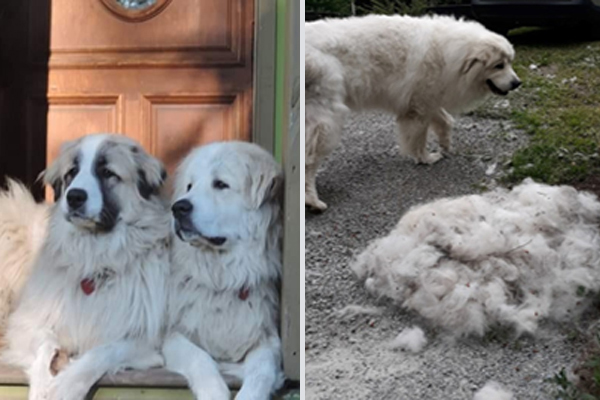
Moss, The Wonder Dog. A youngster, even in dog years, Moss is one of a small band of much-loved working dogs at Parke Creek Farm, in Ellensburg, WA.
Everywhere we look, we see border collies.
In novels, on film, and in advertisements for a vast array of services and products, border collies call for our attention with their confident bearing, their uniquely-colored, luxurious coats, and their mesmerizing eyes. Throughout the day we are presented with images of border collies, gracing couches in households, noses pressed against the rear windows of SUVs, picnicking, frisbee-catching and, in general, frolicking amid family gatherings.
In idle moments, we envision strolling café-lined avenues, our border collie padding beside us on a slack leash. We imagine lounging on a gentle, green rise in a city park, one hand on the head of our slumbering pet, as we peruse a book, whiling away a warm afternoon. We see ourselves as the object of adoration.
However, in the glow of your cozy, companion dog fantasies, do you see this?
A border collie is smarter than you.
Working border collies are widely considered to be the smartest of all domesticated dogs. These dogs have not been bred for conformation to kennel club standards, in other words, not for appearance. Those who have studied these dogs report that they possess the problem-solving abilities of a twelve-year-old human. (Mind you, that is judging the dogs by our criteria. If the dogs were to judge us by their criteria, I confess I wouldn’t want to read that report.)
A border collie is willing, even eager, to work harder than you.
“Border collies were designed to work long and hard in all sorts of weather. They are high-energy dogs, intense and reactive to movement. They are intelligent, but that can be a two-edged sword. They need attention and training to make sure their intelligence is directed into constructive channels.” (From Choosing a Border Collie.)
Sharing your space with a border collie might challenge your self-esteem.
These dogs have almost unnaturally high standards for behavior and on-the-job ethics.
“As with many working breeds, collies can be highly reactive and chase-motivated and may attempt to control movements of family members, cyclists, cars or anything else that moves. Farm-reared sheepdogs can be extremely challenging to many owners.” (From the Wizard-of-Paws, History and Differences of the Border Collie Working Sheep Dog.)
Border collies disapprove of all that is mindless and/or purposeless. They require opportunities to act on their environment. In education courses at college, we called that self-actualization. For children, self-actualization is imperative. For border collies, ditto.
Border collies crave order. They are compelled to deal with distractions. It’s said, for instance, that if a border collie chases a vehicle, it is not to catch it, but to stop it, because the motion of the turning wheels is, to the collie, purposeless.
What then will a border collie think of your X-Box habit?
In short, a border collie will brook no slackers. If your self-esteem is tentative, will having one as a pet be suitable for you?
Issues of self-image aside, border collies are amazing dogs.
Working border collies are selected for temperament: their keen intelligence, stamina—endurance in the field—and their tenacity.
“Because they’re not bred for appearance, border collies don’t all look alike. They can vary in weight from 25 to 55 pounds, with coats that may be smooth, medium, or rough. Colors are typically black, black with tan, and reddish-brown, all usually with white markings, but merle, brindle and predominantly white border collies can also be found … Appearance is not linked with working characteristics.” (From Choosing a Border Collie.)
Again, from the UK’s Wizard-of-Paws:
“Eye colour varies from deep brown to amber or blue with occasionally one eye of each colour, usually seen with merles. The ears of the border collie and working stock dog are also highly variable with some fully erect, some fully dropped ears, and others semi-erect ears. In general, a dog’s appearance is considered to be irrelevant.”
“Appearance is considered to be irrelevant.”
Hmmm, is it possible that having a border collie in your life might strengthen your self-concept?
So, if you are still interested, here are a few reasons to consider keeping company with a border collie.
You will never have another secret. Your every thought will be known and tracked.
Wait a minute! Is that a good thing? Well, maybe. Who among your human friends will take you in hand—errr, paw—when you are inclined to go the easy route?
In my reading, I’ve learned that border collies are extremely “tuned in.” They have what are called “hard eyes;” they are known for having a “hard stare.” It is their direct, unwavering gaze that pins sheep in place or moves them at the collie’s will. Well-trained border collies need neither bark, nor nip (the methodologies of other stock dogs), yet will always get a flock, or a person, to do their bidding.
Border collies, in fact, show a tendency to “herd” children, and even adults, an inclination that must be redirected. (Remember that “hard stare”? While posing no physical threat, it is intimidating and known to make grown men cry.) On the flip side, if you’ve ever felt unseen, unheard (or, un-herded), your border collie will take care of that.
A border collie needs not only regular physical activity, but also varied mental stimulation. Your border collie’s standards for loyalty, dependability and goal-orientation will be higher than yours. Sharing your life with a border collie might open new worlds for you. It might make you a better person—the person he thinks you already are. Chew on that for a while.
Thinking of staying in your pajamas all day? Who knows? You might decide to dial your game up a notch.
“One reason for border collies’ athleticism is their build,” we learn from Robin Elliot, of On The Lamb Herding. “Border collies’ hearts are larger than that of other dogs.”
Ms. Elliot trains various types of stock dogs, and, as we learn in this interesting video, she has seen that when gathering sheep, border collies will tackle a mountainside, running forward, backward, and sideways, continuously for half an hour, without a breather. This distinguishes them among the breeds, she points out. Other dogs simply cannot do that.

